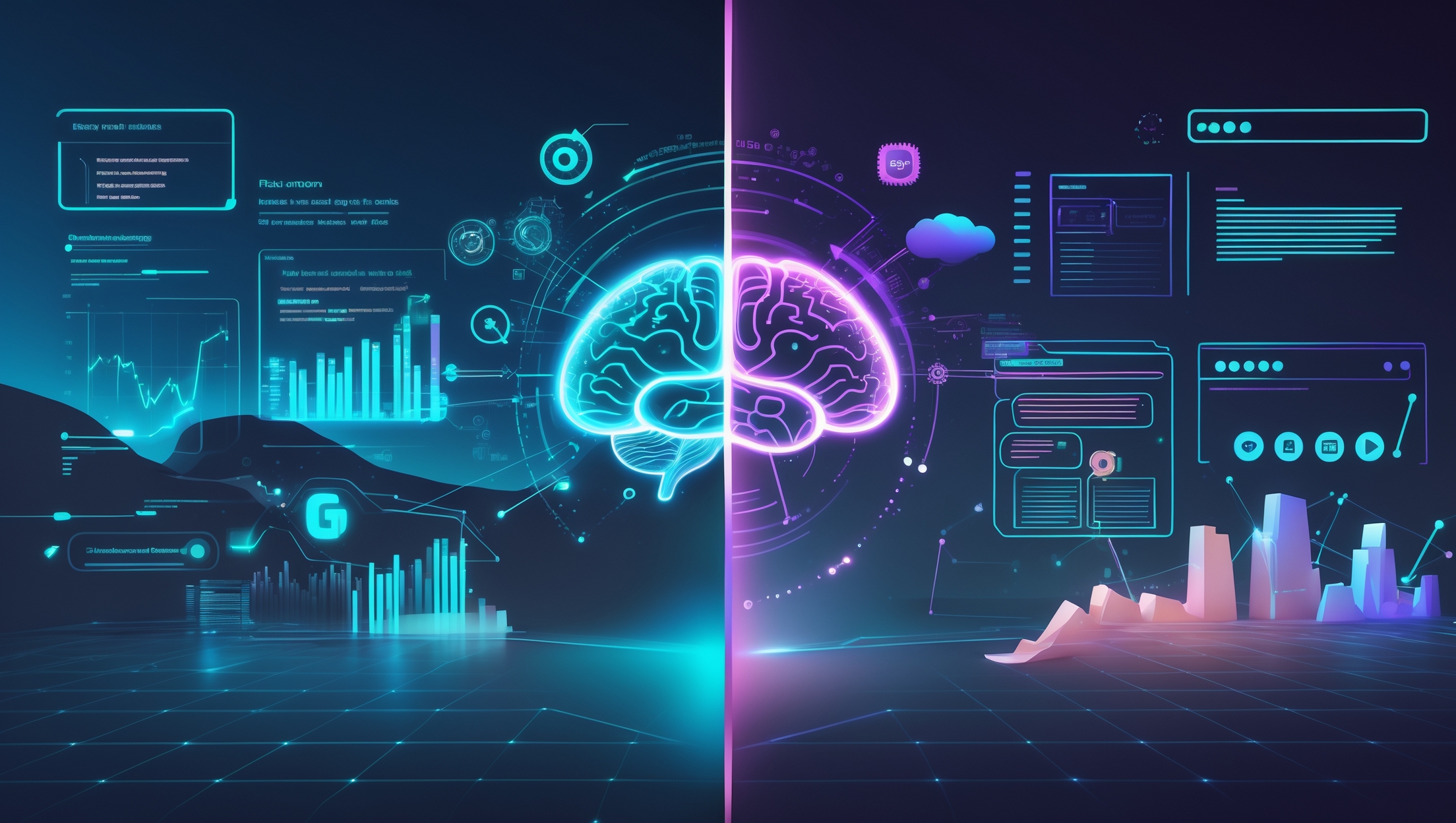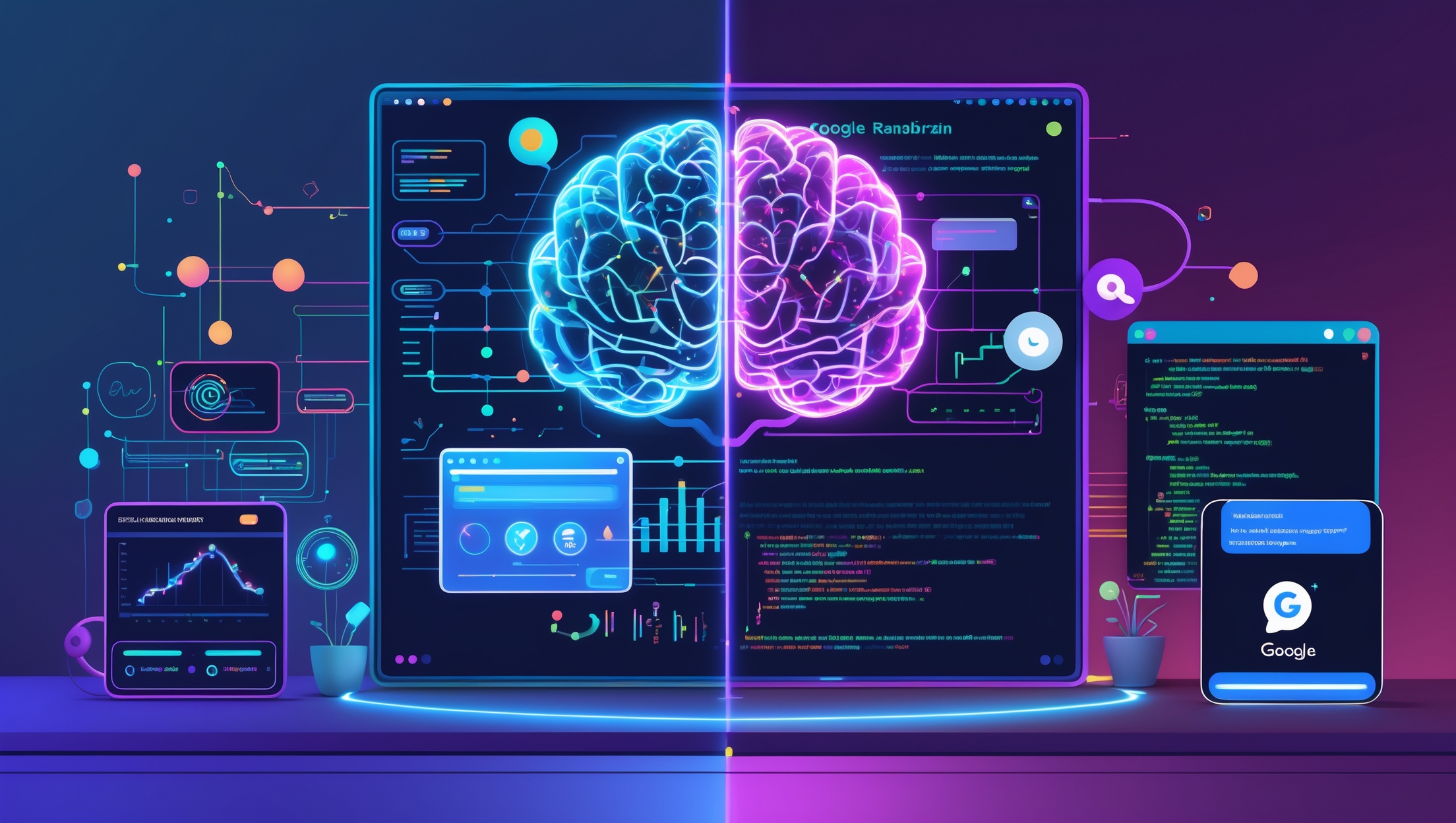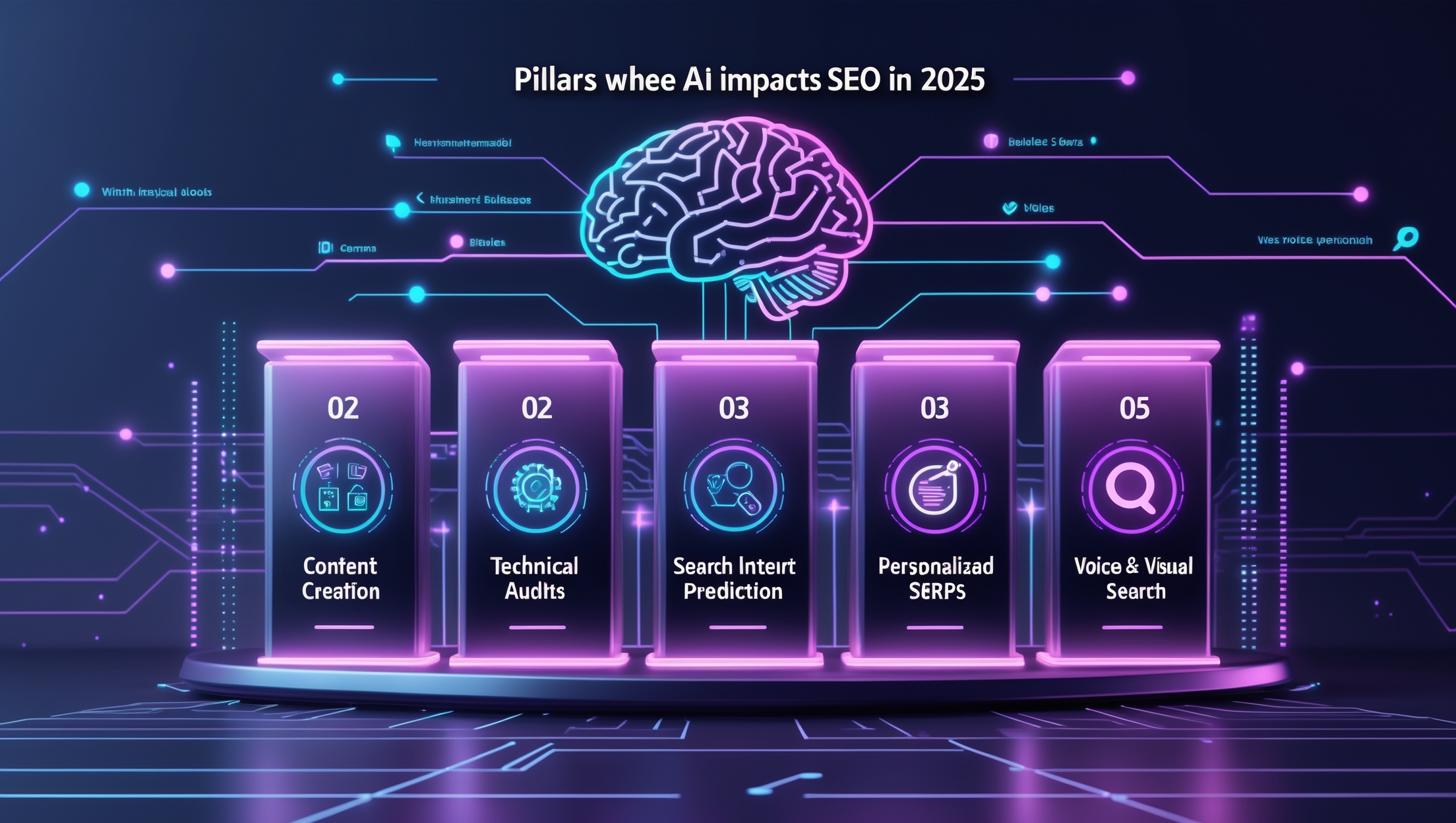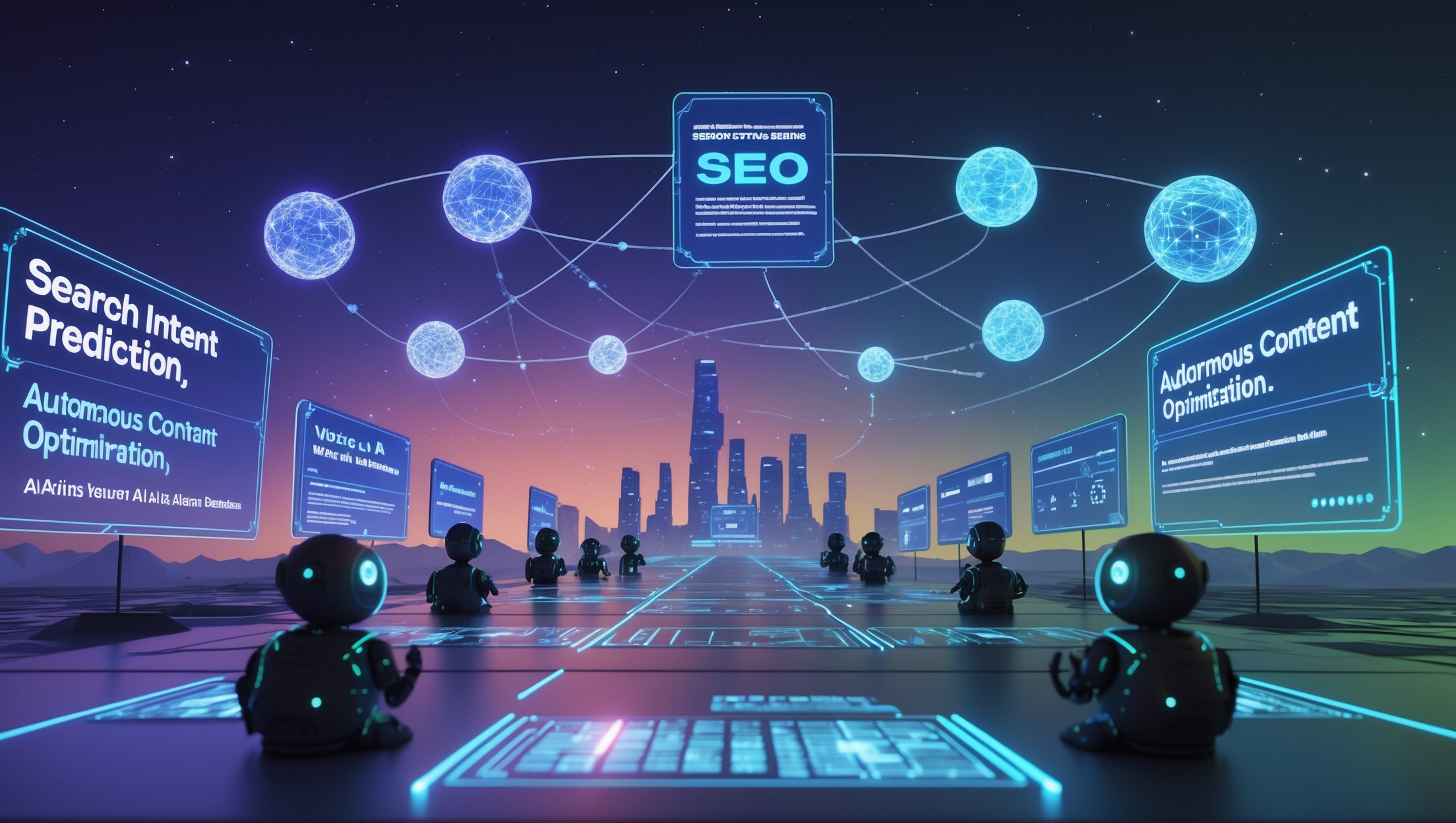How AI is Changing the SEO Landscape in 2025

AI in SEO 2025 isn’t just a trend—it’s a complete redefinition of how we approach search engine optimization. The rules are shifting fast, driven by smarter algorithms, real-time insights, and machine learning systems that can analyze, predict, and optimize faster than any human team.
If you’re still using manual tactics without integrating AI SEO automation, you’re already behind. Modern SEO requires adaptive strategies that leverage predictive SEO to anticipate ranking fluctuations, user behavior, and content opportunities before they even surface.
We’ve moved from keyword stuffing to understanding search intent through context, semantics, and generative AI content frameworks. In this new landscape, success isn’t about who produces the most content—it’s about who uses AI the smartest.
In this article, I’ll walk you through how AI in SEO 2025 is transforming everything from keyword research to on-page optimization, and how you can leverage it to stay ahead of the curve.
A Look Back: From RankBrain to Generative AI

Back in 2015, Google introduced RankBrain—a machine learning update that quietly marked the beginning of AI in SEO. It didn’t just tweak algorithms; it signaled the rise of search engines that could interpret context, not just match keywords.
Fast forward to AI in SEO 2025, and we’re no longer optimizing for algorithms—we’re partnering with them. Today’s AI systems don’t just analyze; they adapt in real-time, continuously learning from search behavior to refine results.
This evolution laid the foundation for predictive SEO strategies, where marketers use tools to anticipate ranking shifts based on content freshness, link velocity, or user intent. Instead of reacting to drops, we’re forecasting them before they happen.
Generative AI tools like ChatGPT, Jasper, and Claude have further changed the game. They’re not just creating content—they’re influencing how we structure it, how we match search intent, and even how we plan internal linking.
For example, using GPT-4 to reverse engineer the top-ranking pages for a niche keyword can uncover structural gaps in your content. Or, leveraging NLP models to identify which questions aren’t answered on page one can help build zero-click optimized content.
More importantly, AI models are learning how users search, not just what they search for. That shift is key to understanding semantic SEO and how AI SEO automation can align our strategies more closely with human behavior.
What started with RankBrain as a background update has become a full-blown AI ecosystem. And if you're not thinking about where it's going next, you're going to be left behind.
Core Areas Where AI Impacts SEO in 2025

The beauty of AI in SEO 2025 is that it's no longer confined to one part of the workflow. From technical audits to content optimization and even UX analysis, AI has embedded itself in every layer of modern SEO.
Take keyword research—once a tedious, spreadsheet-heavy process. Now, AI tools like Surfer, SEMrush's Keyword Wizard, and even GPT-based tools can predict keyword clusters, search intent, and competitive gaps in minutes. This isn’t just data parsing—it’s predictive SEO strategy in action, helping you create content before demand spikes.
When it comes to content creation, generative AI is doing more than just writing words. It's analyzing SERP intent, suggesting relevant subtopics, and even optimizing for passage indexing and featured snippets. This means your blog post doesn’t just "rank"—it dominates specific search features that drive more visibility.
Not every application of AI is flashy, though. A lot of the heavy lifting happens under the hood with AI SEO automation. Think automatic internal linking based on semantic themes, real-time crawl diagnostics, and even dynamically updating content modules based on user engagement patterns. These aren't just nice-to-haves—they're now critical for competing on high-authority SERPs.
One of my favorite examples? A recent SaaS client used AI to identify 300 outdated meta titles across their site and rewrite them based on CTR data and NLP entity extraction. In two weeks, they saw a 14% uptick in organic traffic, purely from automated meta improvements.
Another big shift? Voice search optimization. With more users relying on voice assistants like Siri and Google Assistant, AI is helping us optimize for spoken queries—questions that often sound different than typed searches. Tools now analyze voice syntax, extract conversational phrases, and help rewrite content accordingly.
Even user experience signals like bounce rate and time on page are being evaluated by AI models, which means Google is adapting its rankings based on behavior patterns we can now analyze ourselves.
Bottom line: AI is no longer an “SEO edge”—it’s the operating system. The marketers who embrace its full stack, from automation to intent modeling, are the ones leading the SERPs in 2025 and beyond.
Key Tools & Platforms Leading the AI SEO Revolution
There’s no shortage of tools flooding the market, but in the landscape of AI in SEO 2025, only a few are truly moving the needle. The right stack doesn’t just help—it transforms how you operate.
Generative AI platforms like Jasper, Writesonic, and ChatGPT dominate the content creation side. These tools can write SEO-rich content, rephrase based on tone, and even recommend on-page optimizations using real-time SERP data.
Then there’s Surfer SEO, which combines AI SEO automation with NLP models to analyze top-performing pages and give you a structured content brief in minutes. It's like having a data scientist and content strategist rolled into one.
On the technical side, MarketMuse, Frase, and Outranking.io leverage machine learning in search to build topic models, cluster keywords, and score content relevance. These insights make predictive SEO strategies much more accessible, even for lean teams.
For auditing and optimization at scale, Screaming Frog has started integrating AI-based anomaly detection, while tools like PageImprove (by Semrush) are using GPT for live SEO edits—without needing dev support. Game-changing stuff.
Example? One agency I consulted with integrated Frase + Surfer + Zapier to auto-generate weekly blog outlines from trending search data. What used to take 10 hours per week dropped to 90 minutes—without sacrificing strategy or accuracy.
Whether you're running a solo blog or managing SEO for an enterprise brand, the edge comes from using the right AI tools—not just the newest ones. Stack smart, not wide.
Predictions for AI in SEO (Late 2025 and Beyond)

If you think AI in SEO 2025 is impressive now, wait until you see what’s around the corner. We’re already witnessing a shift from static optimization to adaptive ecosystems—where AI not only supports SEO but steers it.
One big trend? The rise of predictive SEO strategies that go beyond traffic forecasts. AI is now modeling user behavior, seasonality, competitor movement, and even search volatility in ways that help you plan 60–90 days ahead with confidence. You’re not just reacting to algorithm updates—you’re preparing for them proactively.
Expect generative AI to move into full content orchestration. We're talking about tools that don’t just suggest topics—they create pillar pages, internal link maps, and even custom schema markups on the fly. The entire content lifecycle—from ideation to publishing—will soon be AI-driven, with minimal human intervention outside of review and compliance.
Google’s own advancements (Gemini, MUM, etc.) are also pushing toward semantic SEO at scale. Search engines are shifting from keyword-based queries to contextual understanding—factoring in emotion, urgency, device, and even location-specific nuance. This means your content needs to be deeply relevant, not just technically optimized.
Take this hypothetical: Imagine a GPT-powered plugin that monitors your competitors, identifies which keywords they're gaining on, runs a content gap analysis, then drafts a 2,000-word blog post to reclaim ground—all without you lifting a finger. That’s not sci-fi—it’s just months away.
Another likely evolution? Personalized SERPs, fully influenced by AI. Two users might search the same term but receive entirely different results based on their browsing habits, preferences, and inferred intent. If you're not using AI to simulate that variability, you're missing massive visibility opportunities.
What’s clear is this: SEO in the AI age is about systems, not silos. The brands investing in AI SEO automation, personalization, and contextual relevance today are building future-proof strategies that adapt as fast as the algorithms themselves.
Challenges and Risks of AI-Powered SEO
For all the promise of AI in SEO 2025, there’s a flip side you can’t ignore. AI is powerful—but it’s not perfect, and misusing it can quietly sabotage your strategy if you’re not careful.
One major concern is generative AI hallucinations. These tools can produce incredibly convincing content—but they don’t always get the facts right. If you're auto-publishing AI-written posts without human review, you risk misinformation, brand trust erosion, and even manual penalties from search engines.
Then there's the issue of AI SEO automation run amok. Over-automation—especially with internal linking, dynamic headers, or content updates—can cause disjointed UX, content cannibalization, or completely destroy a page’s focus. Just because a tool can make a change doesn’t mean it should.
Even predictive SEO strategies can backfire if you’re relying solely on machine decisions. Let’s say an AI predicts a ranking drop and recommends aggressive content pruning. If you're not verifying that data manually, you could remove high-value evergreen content based on an algorithmic misread.
Here’s a real example: a fintech site used GPT-based content scoring to rewrite dozens of product pages. It focused too heavily on NLP keyword coverage and lost its brand tone. The result? Engagement tanked, bounce rate spiked, and conversions dropped 18% before they rolled it back.
Semantic SEO also introduces complexity. As AI optimizes content for deeper context, it may unintentionally dilute your topical focus if not guided properly. That’s especially true when targeting niche SERPs with tightly bound user intent.
Bottom line: AI is a scalpel, not a sledgehammer. Use it surgically, validate its output, and always keep a human in the loop. The biggest risk in AI-powered SEO isn't the tool—it’s the blind trust in it.
Practical Tips: How to Adapt Your SEO Strategy for AI in 2025
If you want to thrive in the world of AI in SEO 2025, the answer isn’t to completely replace your strategy—it’s to rewire it. That means merging human creativity with the efficiency and precision of automation.
Start by incorporating AI SEO automation into your routine tasks. Use tools like Screaming Frog with GPT plugins for technical audits, or Surfer and Frase for brief generation. These don’t just save time—they elevate the quality of your output. Set up automation rules for internal linking and image alt text to maintain structure without manual oversight.
When it comes to content, don’t just feed prompts into generative AI. Engineer prompts with context: audience type, funnel stage, and content goals. Instead of “Write a blog post on on-page SEO,” try “Create a comparison between manual and AI-powered on-page SEO for small business owners.”
To unlock better predictive SEO strategies, integrate AI with your analytics stack. Feed GA4 data into ChatGPT or Claude to get forecasts for declining pages, rising intent keywords, and traffic anomalies. These early warning signals give you time to adapt before rankings drop.
Example: One of our clients in the SaaS niche created a content model that analyzed 12 months of blog traffic, cross-referenced it with Google Search Console queries, and flagged which pages were slipping due to stale topics. With a single GPT prompt, they generated refresh outlines that boosted those posts back into the top 5 within weeks.
Also, lean into semantic SEO. Use NLP tools to extract related entities, questions, and synonyms that reinforce topical authority. When you structure your content semantically, AI understands it better—and so does Google.
Lastly, stay curious. AI is evolving fast. What works today might be outdated in six months. Keep testing, keep learning, and most importantly, use AI as a partner, not a crutch.
Because the SEOs winning in 2025 aren’t the ones doing everything—but the ones who know what to automate, and what still needs a human touch.
Conclusion
The days of manual-only SEO are behind us—and AI in SEO 2025 has officially taken the wheel. From real-time analysis to generative AI content creation and smart automation tools, we’re in an era where strategy is shaped by data, not guesswork.
But here’s the key: success doesn’t come from chasing shiny tools. It comes from learning how to integrate them into your existing workflows in a way that amplifies what you already do well. That’s where predictive SEO strategies shine—by helping you make smarter moves, faster, and with confidence.
The brands, consultants, and creators who embrace this AI-driven shift will lead the next wave of digital visibility. Those who resist? They’ll spend 2025 playing catch-up.
So start where it matters: audit your stack, align your goals with AI capabilities, and future-proof your content strategy before your competitors do it for you.
Your next SEO breakthrough isn’t manual. It’s intelligent.
FAQs: AI in SEO 2025
1. What is AI in SEO?
AI in SEO refers to the use of artificial intelligence tools and algorithms to improve search engine optimization tasks like keyword research, content creation, technical audits, and rank tracking. In 2025, AI plays a central role in both strategy and execution for modern SEO teams.
2. Is AI replacing traditional SEO strategies?
Not entirely. AI is enhancing traditional SEO by automating repetitive tasks and improving data analysis. Human input is still critical for strategy, brand voice, and editorial oversight.
3. What are the benefits of AI SEO automation?
AI SEO automation helps scale your workflows, reduce manual errors, and deliver faster insights. Tasks like internal linking, metadata optimization, and real-time content scoring can now be handled with minimal human intervention.
4. How does generative AI help with content creation?
Generative AI tools like ChatGPT and Jasper create blog posts, meta descriptions, email copy, and even content briefs. They’re especially powerful for drafting long-form content that matches search intent.
5. What are predictive SEO strategies?
Predictive SEO strategies use AI to anticipate changes in search trends, rankings, and user behavior. These insights help marketers take proactive steps—like updating content or adjusting targeting—before traffic declines occur.
6. Will AI-written content rank on Google?
Yes, AI-written content can rank if it’s original, useful, and well-optimized. However, human editing is still crucial for ensuring accuracy, tone, and alignment with Google’s quality standards.
7. What tools are best for AI-powered SEO?
Top tools in 2025 include Surfer SEO, Frase, Jasper, Outranking, ChatGPT (with custom prompts), and Clearscope. These platforms offer AI-driven features for both technical and content SEO.

